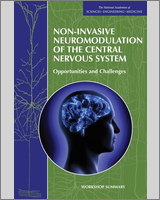NCBI Bookshelf. A service of the National Library of Medicine, National Institutes of Health.
Based on advances in biotechnology and neuroscience, non-invasive neuromodulation devices are poised to gain clinical importance in the coming years and to be of increasing interest to patients, clinicians, health systems, payers, and industry. Evidence suggests that both therapeutic and non-therapeutic applications of non-invasive neuromodulation will continue to expand in coming years, particularly for indications where treatments are currently insufficient, such as drug-resistant depression.
Given the growing interest in non-invasive neuromodulation technologies, the Institute of Medicine's Forum on Neuroscience and Nervous System Disorders convened a workshop, inviting a range of stakeholders - including developers of devices and new technologies, researchers, clinicians, ethicists, regulators, and payers - to explore the opportunities, challenges, and ethical questions surrounding the development, regulation, and reimbursement of these devices for the treatment of nervous system disorders as well as for non-therapeutic uses, including cognitive and functional enhancement. This report highlights the presentation and discussion of the workshop.
Contents
- The National Academies of SCIENCES • ENGINEERING • MEDICINE
- PLANNING COMMITTEE ON NON-INVASIVE NEUROMODULATION OF THE CENTRAL NERVOUS SYSTEM
- FORUM ON NEUROSCIENCE AND NERVOUS SYSTEM DISORDERS
- Reviewers
- 1. Introduction
- 2. Overview of Gaps, Challenges, and Potential Opportunities
- 3. The Science and Technology of Non-Invasive Neuromodulation
- 4. Therapeutic Uses of Non-Invasive Neuromodulation
- 5. Using Non-Invasive Neuromodulation for Diagnosis and Research
- 6. Enhancement of Brain Function and Performance
- 7. Ethical, Legal, and Social Issues
- 8. Regulatory Issues
- 9. Reimbursement Issues
- 10. The Business Environment
- APPENDIXES
Rapporteurs: Lisa Bain, Sheena Posey Norris, and Clare Stroud.
This project was supported by contracts between the National Academy of Sciences and the Alzheimer's Association; Brain Canada Foundation; the Department of Health and Human Services' Food and Drug Administration and National Institutes of Health (NIH, Contract No. HHSN26300026 [Under Master Base #DHHS-10001292]) through the National Center for Complementary and Integrative Health, National Eye Institute, National Institute of Mental Health, National Institute of Neurological Disorders and Stroke, National Institute on Aging, National Institute on Alcohol Abuse and Alcoholism, National Institute on Drug Abuse, and NIH Blueprint for Neuroscience Research; Department of Veterans Affairs (VA240-14-C-0057); Eli Lilly and Company; Foundation for the National Institutes of Health; the Gatsby Charitable Foundation; GlaxoSmithKline, Inc.; Johnson & Johnson Pharmaceutical Research and Development, LLC; Lundbeck Research USA; Merck Research Laboratories; The Michael J. Fox Foundation for Parkinson's Research; the National Multiple Sclerosis Society; the National Science Foundation (BCS-1064270); One Mind for Research; Orion Bionetworks; Pfizer Inc.; Pharmaceutical Product Development, LLC; Sanofi; the Society for Neuroscience; Takeda Pharmaceutical Company Limited; and Wellcome Trust. Any opinions, findings, conclusions, or recommendations expressed in this publication do not necessarily reflect the views of any organization or agency that provided support for this project.
Suggested citation:
National Academies of Sciences, Engineering, and Medicine. 2015. Non-invasive neuromodulation of the central nervous system: Opportunities and challenges: Workshop summary. Washington, DC: The National Academies Press.
- NLM CatalogRelated NLM Catalog Entries
- Review Developing a 21st Century Neuroscience Workforce: Workshop Summary[ 2015]Review Developing a 21st Century Neuroscience Workforce: Workshop SummaryForum on Neuroscience and Nervous System Disorders, Board on Health Sciences Policy, Institute of Medicine. 2015 Aug 26
- Review Exploring Psychedelics and Entactogens as Treatments for Psychiatric Disorders: Proceedings of a Workshop[ 2022]Review Exploring Psychedelics and Entactogens as Treatments for Psychiatric Disorders: Proceedings of a WorkshopNational Academies of Sciences, Engineering, and Medicine; Health and Medicine Division; Board on Health Sciences Policy; Forum on Neuroscience and Nervous System Disorders, Stroud C, Posey Norris SM, Matney C, Bain L. 2022 Sep 1
- Review Harnessing digital technology to predict, diagnose, monitor, and develop treatments for brain disorders.[NPJ Digit Med. 2019]Review Harnessing digital technology to predict, diagnose, monitor, and develop treatments for brain disorders.Stroud C, Onnela JP, Manji H. NPJ Digit Med. 2019; 2:44. Epub 2019 Jun 3.
- Review Enabling Discovery, Development, and Translation of Treatments for Cognitive Dysfunction in Depression: Workshop Summary[ 2015]Review Enabling Discovery, Development, and Translation of Treatments for Cognitive Dysfunction in Depression: Workshop SummaryForum on Neuroscience and Nervous System Disorders, Board on Health Sciences Policy, Institute of Medicine, The National Academies of Sciences, Engineering, and Medicine. 2015 Oct 29
- Review The Value of Genetic and Genomic Technologies: Workshop Summary[ 2010]Review The Value of Genetic and Genomic Technologies: Workshop SummaryInstitute of Medicine (US) Roundtable on Translating Genomic-Based Research for Health. 2010
- Non-Invasive Neuromodulation of the Central Nervous SystemNon-Invasive Neuromodulation of the Central Nervous System
Your browsing activity is empty.
Activity recording is turned off.
See more...
